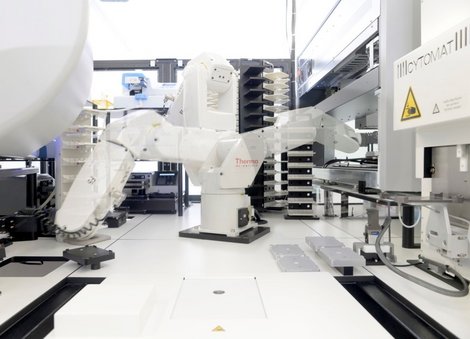Revolutionary Procedure for Vaccine Purification

Navigo Proteins GmbH from Saxony-Anhalt has developed a binding protein for the industrial purification of coronavirus vaccines. Precision Capturing will allow biotherapeutics to be purified significantly more efficiently and economically in the future. The researchers were awarded a prize in recognition of their procedure as part of the IQ Innovationspreis Mitteldeutschland 2020 (IQ Innovation Award for Central Germany 2020).
The restrictions brought in in response to the coronavirus pandemic did not put a stop to the work at Navigo Proteins GmbH – quite the opposite. The biotechnology company based at the Weinberg Campus in Halle reacted quickly to the current situation by setting up a coronavirus task force, making masks compulsory and separating teams onto different floors. The effort was worth it as the company was able to carry on with what it does best: research and development. In this instance it was researching what is known as an affinity ligand, a binding protein to work against the coronavirus spike protein. This is the main component in the majority of coronavirus vaccines, which can then be purified using the binding protein. Collaboration with a large US partner is already underway. “It will be released onto the market as early as this year in order to help manage the enormous challenges of producing billions of vaccines,” says Dr. Oliver Schub, Director of Business Development at Navigo Proteins.
Revolutionary procedure
The patented method of Precision Capturing that Navigo has developed is not just progressive. Oliver Schub calls it “revolutionary”. The use of small, stable scaffold proteins as binders (ligands) enables practically all biotherapeutics to be purified in a tailored process known as affinity chromatography. These protein molecules developed specifically for the relevant vaccine or biotherapeutic function as a magnet: they are positioned on a fixed chromatography supporting material and bind specifically to the agent present in the cell culture medium, which in this case is the coronavirus spike protein. The other components of the cell culture medium are washed away and the spike protein can be almost completely isolated from the chromatography column with a high level of purification. In contrast, conventional purification of biotherapeutics that is not based on affinity takes place over several consecutive stages that are costly and time-consuming and also result in a much lower overall yield. “Our ligands enable a universal, robust process that essentially entails only one step and is more than 90% efficient in terms of purity and yield,” says Schub.
“Our platform is universally applicable, as our unique library containing billions of different binding proteins allows us to select the right counterpart for every agent,” he goes on to explain. The production of these ligands on a commercial scale is now routine; an initial joint development product from the Precision Capturing platform with the US bioprocessing company Repligen Corporation is already on the market and is being distributed to biopharmaceutical companies around the world – an upward trend. Navigo has already agreed to work with another US company on the production and purification of a coronavirus vaccine, which is fast becoming a necessity all over the world. The spike protein affinity purification for the large-scale industrial production of a vaccine is due to start before the end of this year. The company’s Precision Capturing platform came second in this year’s IQ Innovation Award for Central Germany.
Alternative to antibody therapy
In addition to the Precision Capturing process for tailored affinity chromatography, Navigo Proteins is also working on a Precision Targeting platform at the same time. This sees the development of small, therapeutic affinity ligands as an alternative to conventional antibody therapy. Navigo uses its protein engineering expertise in order to equip its small affinity ligands, known as Affilin® proteins, with particular properties so that it can use them flexibly for a variety of purposes. For example, protein-drug conjugates combine the cancer cell recognition of certain Navigo ligands with a cytotoxin that specifically targets cancer cells as the proteins dock and begin their toxic attack only on those cells, rather than throughout the whole body. What’s more, the ligands’ half-life, i.e. their residence time in the blood, can be adjusted to meet requirements. According to Dr. Schub, Precision Targeting could one day replace the classical antibody therapy in some areas, for example due to lower production costs and fewer side effects, as well as improved effectiveness. A well-known European drug conjugate company positively tested a Navigo antibody alternative molecule in pre-clinical trials and is further advancing the development. The first clinical phase for solid tumors is due to start soon in humans.
The procedure can also be used in theranostics, a term which is a combination of therapy and diagnostics. This makes it possible to first use the Navigo proteins in specific imaging procedures in tumor diagnostics with the help of coupled substances, for example. Afterwards, the same ligand is coupled with a short-lived radioactive substance and used for targeted cancer cell elimination. Because the molecules bind only to the cancer cells, it is possible to precisely target and treat the tumor from within, meaning it is no longer necessary to expose the body’s exterior to irradiation.
Perfect infrastructure
Precision Targeting was also developed by Scil Proteins GmbH, a spin-off from Martin Luther University Halle-Wittenberg and Navigo’s predecessor. A part of the company was spun off in 2014 and sold to Wacker Biotech. Scil Proteins GmbH continued to grow at its site on Weinberg Campus and was taken over by Vetter Pharma GmbH in 2017. Today it operates under the name Navigo Proteins GmbH. It is now on an equal footing with internationally renowned biotechnology companies. But it isn’t the only successful company operating at the unique Weinberg Campus, which is one of the 12 Centers of Excellence in Saxony-Anhalt and Central Germany’s largest technology park. The Campus is home to more than 100 companies working in the life sciences and material sciences industry, internationally acclaimed research institutions and the science faculties of Martin Luther University Halle-Wittenberg, with a total of 5,500 scientists and employees. The state of Saxony-Anhalt has supported investments of more than one billion euros in the park. Schub sees the Campus’s ability to bring together organizations such as the Fraunhofer Institute and the University as one of its great advantages: “The infrastructure is perfect. We also really value that this connection to scientific institutions helps us to find the highly-qualified, skilled workers that we need.” Navigo Protein GmbH currently employees a workforce of 50, but there are plans to employ more people in the long term. The state of Saxony-Anhalt will support this initiative, too. On a recent visit to Navigo Proteins, the state’s Minister for the Economy, Armin Willingmann, awarded the company a grant approval to purchase a state-of-the-art laboratory device for affinity measurement, which will allow up to 32 samples to be processed at once, rather than just one.
Author: Anja Falgowski/IMG Saxony-Anhalt

Our pathfinders find solutions, define new goals and pave the way for opportunities arising from times of crisis. The Investment and Marketing Corporation presents them, reports on TRULY advanced researchers and developers, TRULY pioneering companies and TRULY inspiring personalities.
You will find the news and stories, the pioneer stories and portraits of "makers" HERE.
